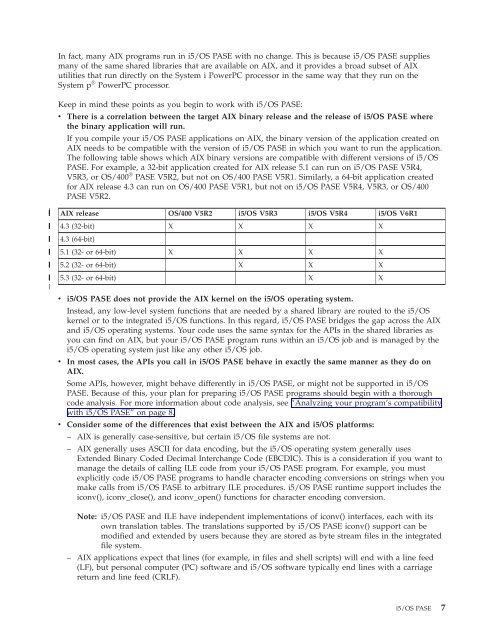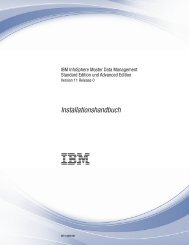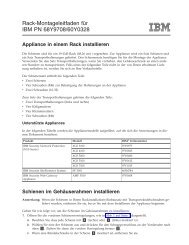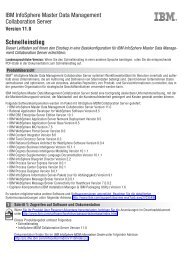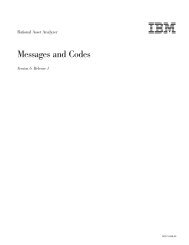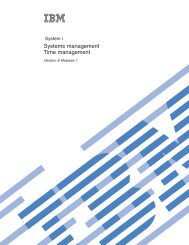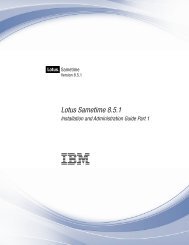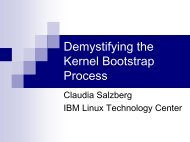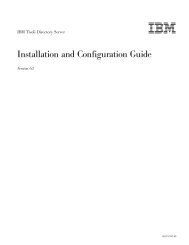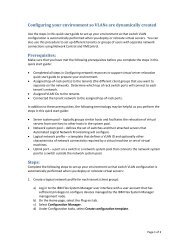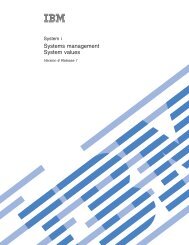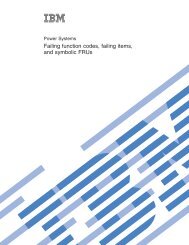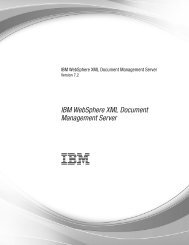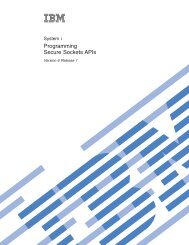System i: Programming i5/OS PASE - IBM
System i: Programming i5/OS PASE - IBM
System i: Programming i5/OS PASE - IBM
Create successful ePaper yourself
Turn your PDF publications into a flip-book with our unique Google optimized e-Paper software.
|<br />
|<br />
|<br />
|<br />
|<br />
|<br />
|<br />
In fact, many AIX programs run in <strong>i5</strong>/<strong>OS</strong> <strong>PASE</strong> with no change. This is because <strong>i5</strong>/<strong>OS</strong> <strong>PASE</strong> supplies<br />
many of the same shared libraries that are available on AIX, and it provides a broad subset of AIX<br />
utilities that run directly on the <strong>System</strong> i PowerPC processor in the same way that they run on the<br />
<strong>System</strong> p ® PowerPC processor.<br />
Keep in mind these points as you begin to work with <strong>i5</strong>/<strong>OS</strong> <strong>PASE</strong>:<br />
v There is a correlation between the target AIX binary release and the release of <strong>i5</strong>/<strong>OS</strong> <strong>PASE</strong> where<br />
the binary application will run.<br />
If you compile your <strong>i5</strong>/<strong>OS</strong> <strong>PASE</strong> applications on AIX, the binary version of the application created on<br />
AIX needs to be compatible with the version of <strong>i5</strong>/<strong>OS</strong> <strong>PASE</strong> in which you want to run the application.<br />
The following table shows which AIX binary versions are compatible with different versions of <strong>i5</strong>/<strong>OS</strong><br />
<strong>PASE</strong>. For example, a 32-bit application created for AIX release 5.1 can run on <strong>i5</strong>/<strong>OS</strong> <strong>PASE</strong> V5R4,<br />
V5R3, or <strong>OS</strong>/400 ® <strong>PASE</strong> V5R2, but not on <strong>OS</strong>/400 <strong>PASE</strong> V5R1. Similarly, a 64-bit application created<br />
for AIX release 4.3 can run on <strong>OS</strong>/400 <strong>PASE</strong> V5R1, but not on <strong>i5</strong>/<strong>OS</strong> <strong>PASE</strong> V5R4, V5R3, or <strong>OS</strong>/400<br />
<strong>PASE</strong> V5R2.<br />
AIX release <strong>OS</strong>/400 V5R2 <strong>i5</strong>/<strong>OS</strong> V5R3 <strong>i5</strong>/<strong>OS</strong> V5R4 <strong>i5</strong>/<strong>OS</strong> V6R1<br />
4.3 (32-bit)<br />
4.3 (64-bit)<br />
X X X X<br />
5.1 (32- or 64-bit) X X X X<br />
5.2 (32- or 64-bit) X X X<br />
5.3 (32- or 64-bit) X X<br />
v <strong>i5</strong>/<strong>OS</strong> <strong>PASE</strong> does not provide the AIX kernel on the <strong>i5</strong>/<strong>OS</strong> operating system.<br />
Instead, any low-level system functions that are needed by a shared library are routed to the <strong>i5</strong>/<strong>OS</strong><br />
kernel or to the integrated <strong>i5</strong>/<strong>OS</strong> functions. In this regard, <strong>i5</strong>/<strong>OS</strong> <strong>PASE</strong> bridges the gap across the AIX<br />
and <strong>i5</strong>/<strong>OS</strong> operating systems. Your code uses the same syntax for the APIs in the shared libraries as<br />
you can find on AIX, but your <strong>i5</strong>/<strong>OS</strong> <strong>PASE</strong> program runs within an <strong>i5</strong>/<strong>OS</strong> job and is managed by the<br />
<strong>i5</strong>/<strong>OS</strong> operating system just like any other <strong>i5</strong>/<strong>OS</strong> job.<br />
v In most cases, the APIs you call in <strong>i5</strong>/<strong>OS</strong> <strong>PASE</strong> behave in exactly the same manner as they do on<br />
AIX.<br />
Some APIs, however, might behave differently in <strong>i5</strong>/<strong>OS</strong> <strong>PASE</strong>, or might not be supported in <strong>i5</strong>/<strong>OS</strong><br />
<strong>PASE</strong>. Because of this, your plan for preparing <strong>i5</strong>/<strong>OS</strong> <strong>PASE</strong> programs should begin with a thorough<br />
code analysis. For more information about code analysis, see “Analyzing your program’s compatibility<br />
with <strong>i5</strong>/<strong>OS</strong> <strong>PASE</strong>” on page 8.<br />
v Consider some of the differences that exist between the AIX and <strong>i5</strong>/<strong>OS</strong> platforms:<br />
– AIX is generally case-sensitive, but certain <strong>i5</strong>/<strong>OS</strong> file systems are not.<br />
– AIX generally uses ASCII for data encoding, but the <strong>i5</strong>/<strong>OS</strong> operating system generally uses<br />
Extended Binary Coded Decimal Interchange Code (EBCDIC). This is a consideration if you want to<br />
manage the details of calling ILE code from your <strong>i5</strong>/<strong>OS</strong> <strong>PASE</strong> program. For example, you must<br />
explicitly code <strong>i5</strong>/<strong>OS</strong> <strong>PASE</strong> programs to handle character encoding conversions on strings when you<br />
make calls from <strong>i5</strong>/<strong>OS</strong> <strong>PASE</strong> to arbitrary ILE procedures. <strong>i5</strong>/<strong>OS</strong> <strong>PASE</strong> runtime support includes the<br />
iconv(), iconv_close(), and iconv_open() functions for character encoding conversion.<br />
Note: <strong>i5</strong>/<strong>OS</strong> <strong>PASE</strong> and ILE have independent implementations of iconv() interfaces, each with its<br />
own translation tables. The translations supported by <strong>i5</strong>/<strong>OS</strong> <strong>PASE</strong> iconv() support can be<br />
modified and extended by users because they are stored as byte stream files in the integrated<br />
file system.<br />
– AIX applications expect that lines (for example, in files and shell scripts) will end with a line feed<br />
(LF), but personal computer (PC) software and <strong>i5</strong>/<strong>OS</strong> software typically end lines with a carriage<br />
return and line feed (CRLF).<br />
<strong>i5</strong>/<strong>OS</strong> <strong>PASE</strong> 7


